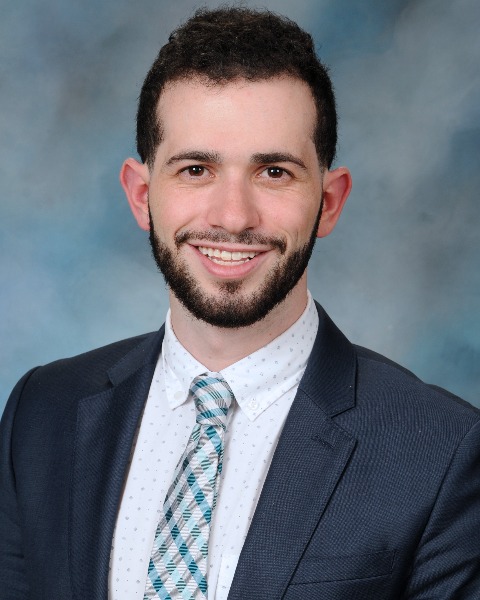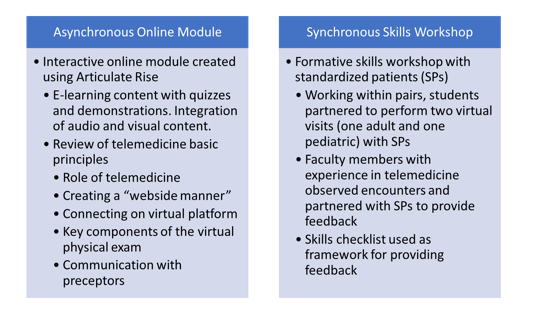Back
Medical Education: Medical Student
Category: Abstract Submission
Medical Education 14 - Medical Education: Resident V
280 - Qualitative assessment of a competency based telemedicine curriculum for preclinical students
Monday, April 25, 2022
3:30 PM – 6:00 PM US MT
Poster Number: 280
Publication Number: 280.420
Publication Number: 280.420
Evin S. Feldman, NewYork-Presbyterian Morgan Stanley Children's Hospital, Long Island City, NY, United States; Marguerite Costich, Columbia University, New York, NY, United States; Suzanne Friedman, Columbia University Vagelos College of Physicians and Surgeons, New York, NY, United States; Theresa E. Scott, NewYork-Presbyterian Morgan Stanley Children's Hospital/Columbia University Medical Center and NewYork-Presbyterian Komansky Children’s Hospital/Weill Cornell Medical Center, New York, NY, United States; Marina Catallozzi, Columbia University Irving Med, NEW YORK, NY, United States; Beth Barron, Columbia University Vagelos College of Physicians and Surgeons, New York, NY, United States; Joseph Picoraro, Columbia University Vagelos College of Physicians and Surgeons, New York, NY, United States

Evin S. Feldman, MD
Resident
NewYork-Presbyterian Morgan Stanley Children's Hospital
Long Island City, New York, United States
Presenting Author(s)
Background: The volume of telemedicine (TM) visits has increased exponentially over the past two years, and is expected to remain a significant part of the clinical landscape. While there is overlap of skills needed to perform both in-person and TM visits, studies have demonstrated substantial gaps in trainees’ abilities to evaluate patients via TM in the absence of specific TM training. While most current curricula are aimed at residents and clinical medical students, few curricula have described training interventions for pre-clinical students designed to prepare them for their upcoming clinical rotations and telemedicine clinical experiences.
Objective: 1) Develop a multimodal competency-based curriculum in TM for pre-clinical medical students; 2) Understand faculty perceptions of essential TM skills, strengths and limitations of the curriculum, and experiences teaching TM.
Design/Methods: As part of their clinical skills course, a skill-building, multimodal competency-based curriculum for pre-clinical medical students was created, including basic TM principles and logistics of conducting a TM encounter on an interactive asynchronous platform, Articulate Rise. The formative skills workshop component of the curriculum featured simulated encounters with standardized patients (SPs) and structured debriefing and feedback with SPs and faculty facilitators (Figure 1). Following curricular implementation, faculty facilitators were invited to participate in semi-structured individual interviews exploring perceptions of the curriculum, TM, and students’ skills. The team utilized thematic analysis to understand faculty perceptions and two team members coding the transcript had adequate agreement (k=0.76) and discussed and resolved disagreements.
Results: Seventy percent of faculty facilitators participated in interviews (n=7). Themes that reflected the domains of the interview included the role and benefits of TM, essential skills for students to learn within TM, and perceptions of the curriculum are further described in Table 1.Conclusion(s): Telemedicine is now one of the Entrustable Professional Activities and an important skill to develop for medical students. Supportive and interested faculty are an important aspect of the implementation of this skill set for pre-clinical students. Faculty facilitators’ perceptions of the training highlight the essential skills students need to participate in TM and identify areas for improvement in training content and structure. A similar curriculum can be implemented for pre-clinical students in a variety of settings.
Figure 1 Preclinical Telemedicine Curriculum Structure
Preclinical Telemedicine Curriculum Structure
Table 1.png) Themes and Subthemes from Faculty TM Curriculum Facilitator Interview Responses.
Themes and Subthemes from Faculty TM Curriculum Facilitator Interview Responses.
Objective: 1) Develop a multimodal competency-based curriculum in TM for pre-clinical medical students; 2) Understand faculty perceptions of essential TM skills, strengths and limitations of the curriculum, and experiences teaching TM.
Design/Methods: As part of their clinical skills course, a skill-building, multimodal competency-based curriculum for pre-clinical medical students was created, including basic TM principles and logistics of conducting a TM encounter on an interactive asynchronous platform, Articulate Rise. The formative skills workshop component of the curriculum featured simulated encounters with standardized patients (SPs) and structured debriefing and feedback with SPs and faculty facilitators (Figure 1). Following curricular implementation, faculty facilitators were invited to participate in semi-structured individual interviews exploring perceptions of the curriculum, TM, and students’ skills. The team utilized thematic analysis to understand faculty perceptions and two team members coding the transcript had adequate agreement (k=0.76) and discussed and resolved disagreements.
Results: Seventy percent of faculty facilitators participated in interviews (n=7). Themes that reflected the domains of the interview included the role and benefits of TM, essential skills for students to learn within TM, and perceptions of the curriculum are further described in Table 1.Conclusion(s): Telemedicine is now one of the Entrustable Professional Activities and an important skill to develop for medical students. Supportive and interested faculty are an important aspect of the implementation of this skill set for pre-clinical students. Faculty facilitators’ perceptions of the training highlight the essential skills students need to participate in TM and identify areas for improvement in training content and structure. A similar curriculum can be implemented for pre-clinical students in a variety of settings.
Figure 1
 Preclinical Telemedicine Curriculum Structure
Preclinical Telemedicine Curriculum StructureTable 1
.png) Themes and Subthemes from Faculty TM Curriculum Facilitator Interview Responses.
Themes and Subthemes from Faculty TM Curriculum Facilitator Interview Responses.